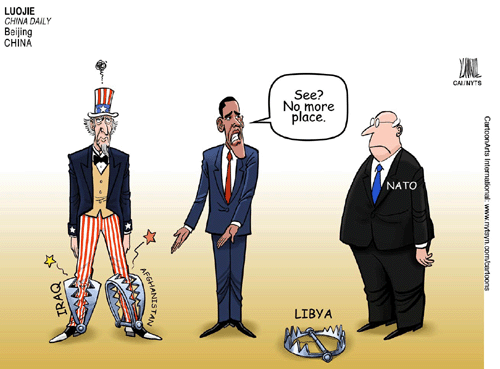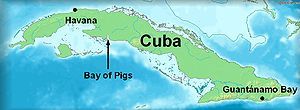U.S. secretly backed Syrian opposition groups, cables released by WikiLeaks show
By Craig Whitlock
The State Department has secretly financed Syrian political opposition groups and related projects, including a satellite TV channel that beams anti-government programming into the country, according to previously undisclosed diplomatic cables.
The London-based satellite channel, Barada TV, began broadcasting in April 2009 but has ramped up operations to cover the mass protests in Syria as part of a long-standing campaign to overthrow the country’s autocratic leader, Bashar al-Assad. Human rights groups say scores of people have been killed by Assad’s security forces since the demonstrations began March 18; Syria has blamed the violence on “armed gangs.”
April 2011 archive
Apr 18 2011
Six In The Morning
Apr 18 2011
DocuDharma Digest
Regular Features-
- Late Night Karaoke by mishima
- Six In The Morning by mishima
Featured Essays for April 17, 2011-
- My Little Town 20110414: The Day I Set Myself on Fire by Translator
- Another Congressional Game of Chicken: The Debt Ceiling by TheMomCat
- Hey You. Yeah You! : A Moment of Clarity by Edger
- Shad Roe by ek hornbeck
- Sunday Morning: Taxes by jimstaro
- Pique the Geek 20110417: Vinyl Records by Translator
Apr 18 2011
Pique the Geek 20110417: Vinyl Records
This is sort of a companion piece to Friday’s Popular Culture piece about eight track tapes. There was quite a response to that piece, and several commentators suggested that we talk about vinyl records tonight. I have a great respect for my readers, so I am happy to oblige.
On the surface, records seem to be quite simple things indeed. In practice, few things are further from the truth. While the concept behind records is fairly simple, the technology is extremely complex to attain high fidelity, defined as sound reproduced with high enough quality as to give the impression that actual performers are playing at the time. In other words, artifacts of recording and playback should be so small as barely to be noticed.
Apr 18 2011
from firefly-dreaming 17.4.11
This is an Open Thread

Essays Featured Sunday the 17th of April:
Late Night Karaoke shines a spotlight on Sylvia’s Mother, mishima DJs
Six Brilliant Articles! from Six Different Places!! on Six Different Topics!!!
Six Days a Week!!! at Six in the Morning!!!!
Alma‘s got ‘puter troubles. LOLs are Sunday Open Thoughts.
in Gabriel D‘s Perfect Conversation discussion is centered on & around Status and Challenge
This edition of Bill Egnor‘s Sunday Bread is scrumptious Bacon Italian Bread
OK, Now Look! wherein edger helps me promote firefly (^.^)

join the conversation! come firefly-dreaming with me….
Apr 17 2011
Rant of the Week: Rep. Joseph Crowley
Rep. Joseph Crowley (D-NY 7) gave a speechless speech on the floor of the House to rant about the GOP’s lack of bills to create jobs.
He broke a little new ground in the area of floor speeches by giving an entire floor speech but not speaking at all.
Standing in front of an easel, he ripped down sheets of paper with words on them, giving his angry speech, but not actually saying a word of the partisan invective.
Apr 17 2011
On This Day In History April 17
This is your morning Open Thread. Pour your favorite beverage and review the past and comment on the future.
Find the past “On This Day in History” here.
April 17 is the 107th day of the year (108th in leap years) in the Gregorian calendar. There are 258 days remaining until the end of the year.
On this day in 1961, The Bay of Pigs invasion begins when a CIA-financed and -trained group of Cuban refugees lands in Cuba and attempts to topple the communist government of Fidel Castro. The attack was an utter failure.
Fidel Castro had been a concern to U.S. policymakers since he seized power in Cuba with a revolution in January 1959. Castro’s attacks on U.S. companies and interests in Cuba, his inflammatory anti-American rhetoric, and Cuba’s movement toward a closer relationship with the Soviet Union led U.S. officials to conclude that the Cuban leader was a threat to U.S. interests in the Western Hemisphere. In March 1960, President Dwight D. Eisenhower ordered the CIA to train and arm a force of Cuban exiles for an armed attack on Cuba. John F. Kennedy inherited this program when he became president in 1961.
On March 17, 1960, US President Dwight D. Eisenhower approved a document prepared by the 5412 Committee (also known as the ‘Special Group’), at a meeting of the US National Security Council (NSC). The stated first objective of the plan began as follows:
A PROGRAM OF COVERT ACTION AGAINST THE CASTRO REGIME
1. Objective: The purpose of the program outlined herein is to bring about the replacement of the Castro regime with one more devoted to the true interests of the Cuban people and more acceptable to the U.S. in such a manner to avoid any appearance of U.S. intervention.The outline plan (code-named Operation Pluto) was organized by CIA Deputy Director for Plans Richard Mervin Bissell, Jr., under CIA Director Allen Dulles. Having experience in actions such as the 1954 Guatemalan coup d’etat, Dulles was confident that the CIA was capable of overthrowing the Cuban government as led by prime minister Fidel Castro since February 1959. The first detailed CIA plan proposed a ship-borne invasion at the old colonial city of Trinidad, Cuba, about 270 km (170 mi) south-east of Havana, at the foothills of the Escambray Mountains in Sancti Spiritus province. Trinidad had good port facilities, it was closer to many existing counter-revolutionary activities, it had an easily defensible beachhead, and it offered an escape route into the Escambray Mountains. When that plan was rejected by the State Department, the CIA went on to propose an alternative plan. On April 4, 1961, President Kennedy then approved the Bay of Pigs plan (also known as Operation Zapata), because it had an airfield that would not need to be extended to handle bomber operations, it was further away from large groups of civilians than the Trinidad plan, and it was less “noisy” militarily, which would make any future denial of direct US involvement more plausible. The invasion landing area was changed to beaches bordering the Bahia de Cochinos (Bay of Pigs) in Las Villas Province, 150 km south-east of Havana, and east of the Zapata peninsula. The landings were to take place at Playa Giron (code-named Blue Beach), Playa Larga (code-named Red Beach), and Caleta Buena Inlet (code-named Green Beach).
In March 1961, the CIA helped Cuban exiles in Miami to create the Cuban Revolutionary Council (CRC), chaired by Jose Miro Cardona, former Prime Minister of Cuba in January 1959. Cardona became the de facto leader-in-waiting of the intended post-invasion Cuban government.
The first part of the plan was to destroy Castro’s tiny air force, making it impossible for his military to resist the invaders. On April 15, 1961, a group of Cuban exiles took off from Nicaragua in a squadron of American B-26 bombers, painted to look like stolen Cuban planes, and conducted a strike against Cuban airfields. However, it turned out that Castro and his advisers knew about the raid and had moved his planes out of harm’s way. Frustrated, Kennedy began to suspect that the plan the CIA had promised would be “both clandestine and successful” might in fact be “too large to be clandestine and too small to be successful.”
But it was too late to apply the brakes. On April 17, the Cuban exile brigade began its invasion at an isolated spot on the island’s southern shore known as the Bay of Pigs. Almost immediately, the invasion was a disaster. The CIA had wanted to keep it a secret for as long as possible, but a radio station on the beach (which the agency’s reconnaissance team had failed to spot) broadcast every detail of the operation to listeners across Cuba. Unexpected coral reefs sank some of the exiles’ ships as they pulled into shore. Backup paratroopers landed in the wrong place. Before long, Castro’s troops had pinned the invaders on the beach, and the exiles surrendered after less than a day of fighting; 114 were killed and over 1,100 were taken prisoner.
Bay of Pigs: The Aftermath
According to many historians, the CIA and the Cuban exile brigade believed that President Kennedy would eventually allow the American military to intervene in Cuba on their behalf. However, the president was resolute: As much as he did not want to “abandon Cuba to the communists,” he said, he would not start a fight that might end in World War III. His efforts to overthrow Castro never flagged-in November 1961, he approved Operation Mongoose, an espionage and sabotage campaign-but never went so far as to provoke an outright war. In 1962, the Cuban missile crisis inflamed American-Cuban-Soviet tensions even further.
Fidel Castro is still Cuba’s symbolic leader today, although his younger brother Raul (1931-) has taken over the presidency and serves as commander in chief of the armed forces.
Apr 17 2011
Punting the Pundits: Sunday Preview Edition
“Punting the Pundits” is an Open Thread. It is a selection of editorials and opinions from around the news medium and the internet blogs. The intent is to provide a forum for your reactions and opinions, not just to the opinions presented, but to what ever you find important.
Thanks to ek hornbeck, click on the link and you can access all the past “Punting the Pundits”.
The Sunday Talking Heads:
This Week with Christiane Amanpour: Ms. Amanpour’s guest will be Treasury Secretary Timothy Geithner discussing the debt ceiling. A gang of Tea Party Republicans, Reps. Joe Walsh (R-Ill), Steve Southerland (R-Fl), Renee Ellmers (R-NC) and Allen West (R-Fl), “debate” that and the looming debt crisis and Donald Trump.
The roundtable with George Will, economist Alice Rivlin of the National Commission on Fiscal Responsibility and Reform, political strategist Matthew Dowd and Massachusetts Gov. Deval Patrick debate the competing budget plans.
Face the Nation with Bob Schieffer: Mr. Scheiffer’s guests are Rep. Paul Ryan (R-WI) and Sen. Mark Warner (D-VA) to discuss the deficit and debt reduction
The Chris Matthews Show: This week’s guests are Joe Klein, TIME Columnist, Norah O’Donnell, MSNBC Chief Washington Correspondent, Becky Quick, CNBC Co-Anchor, Squawk Box and Andrew Sullivan, The Daily Beast Editor, The Dish, who will discuss these questions:
Why is raising taxes on the rich so tough?
What if there Is no hell?
Meet the Press with David Gregory:Tim Geithner makes another appearance to discuss spending and the debt ceiling and Gov. Deval Patrick (D-MA)joins David Gregory to discuss the candidacy of Mitt Romney.
At the round table, Fmr. chairman of the Federal Reserve, Alan Greenspan; Sen. Mike Lee (R-UT), Fmr. Gov. Jennifer Granholm (D-MI); author Jon Meacham; and author of the new book “Fail Up,” PBS’s Tavis Smiley will add their opinions on Romney
State of the Union with Candy Crowley: Republican Sen. Rand Paul of Kentucky and Democratic Rep. Anthony Weiner of New York will join Ms Crowley exclusively to debate the buget competing proposals.
Former CIA Director, Gen. Michael Hayden (Ret.) will discuss the Libya crisis. The former president of Shell Oil, John Hofmeister will try to explain rising gas prices when there is no shortage and another interview with Donald Trump
Now that you’ve read this, you can go back to bed or get out in the fresh air.
 Glenn Greenwald: Mission Transformation in Libya
Glenn Greenwald: Mission Transformation in Libya
Barack Obama, March 28, 2011, explaining America’s involvement in the war in Libya:
Of course, there is no question that Libya — and the world — would be better off with Qaddafi out of power. I, along with many other world leaders, have embraced that goal, and will actively pursue it through non-military means. But broadening our military mission to include regime change would be a mistake.
Barack Obama, David Cameron, Nicolas Sarkozy, joint Op-Ed, yesterday:
The bombing continues until Gaddafi goes
Our duty and our mandate under UN Security Council Resolution 1973 is to protect civilians, and we are doing that. It is not to remove Gaddafi by force. . . . However, so long as Gaddafi is in power, Nato and its coalition partners must maintain their operations so that civilians remain protected and the pressure on the regime builds. Then a genuine transition from dictatorship to an inclusive constitutional process can really begin, led by a new generation of leaders. For that transition to succeed, Colonel Gaddafi must go, and go for good.
Whatever one thinks about this war limited humanitarian intervention on the merits, this is not the mission that Obama cited when justifying America’s involvement. It’s the opposite: “broadening our military mission to include regime change would be a mistake” v. “so long as Gaddafi is in power, Nato and its coalition partners must maintain their operations.” To claim that “regime change” is subsumbed under the goal of “protecting civilians” is to define that objective so broadly as to render it meaningless and, independently, is to violate Obama’s explicit decree at the start that regime change would not be the military goal. Finally, note the blithe dismissal of the very limited U.N. Resolution that initially justified all this: it does not provide for regime change in Libya by force, acknowledged the three leaders, but that, in essence, is what we’re going to do anyway (continue “operations” until he’s gone).
John Nichols: How Socialists Built America
This article is adapted from The “S” Word: A Short History of an American Tradition… Socialism, published in March by Verso.
If there’s one constant in the elite national discourse of the moment, it is the claim that America was founded as a capitalist country and that socialism is a dangerous foreign import that, despite our unwarranted faith in free trade, must be barred at the border. This most conventional “wisdom”-increasingly accepted at least until the recent grassroots mobilizations in Wisconsin, Ohio, Michigan and Maine-has held that everything public is inferior to everything private, that corporations are always good and unions always bad, that progressive taxation is inherently evil and that the best economic model is the one that allows the wealthy to gobble up as much of the Republic as they choose before anything trickles down to the great mass of Americans. Rush Limbaugh informs us regularly that proposals to tax people as rich as he is for the purpose of providing healthcare for kids and jobs for the unemployed are “antithetical” to the nation’s original intent and that Barack Obama’s reforms are “destroying this country as it was founded.”
MIchelle Chen: A Year On, BP Oil Still Mars Gulf Communities, Public Scrutiny Dries Up
The April 14 meeting proceeded efficiently, as scheduled, for BP shareholders. For the workers, environmentalists and community members rallying in protest, though, the day of reckoning had yet to arrive.
The government and media may be moving on from aftermath of the Deepwater disaster, but the scars left behind by the spill are still raw and festering.
First, Congress has passed no legislation to prevent the kind of disaster that touched off the explosion that killed 11 workers and poured masses of oil into the Gulf of Mexico.
Bill McKibben; What if Your President’s Just Not That Into You?
Tomorrow in Washington, at the sprawling and wonderful Power Shift, a few of us are on a panel titled “What If Your President’s Just Not That Into You?” Funny title, serious question.
The first thing: those of us in the environmental movement aren’t high school sophomores feeling jilted by their first crush. Most of us liked Obama a lot: I was among the first green leaders to join upon ‘Environmentalists for Obama,’ back when he seemed a longshot. It wasn’t because I thought he would solve every problem; it’s because I thought he’d make climate change one of the top two priorities of his presidency. And he thought so too: on the day in June of 2008 when he finally clinched the nomination he said that people would someday look back and say “this was the moment when the rise of the oceans began to slow and our planet began to heal.”
Apr 17 2011
A Raptor from ORD — Updated with a bonus Raptor
A couple of days ago, while I was taking my 10 o’clock constitutional :), I was fortunate enough to be graced by nature. There in a scraggly tree still bare from its winter sleep was a handsome raptor.

Now, palantir is a city-boy and this was as close as I’d ever come to anything wilder than biker bar. So I was, as every smoker who passed, intrigued by the magnificent bird.
Apr 17 2011
Six In The Morning
Japan nuclear crisis ‘over in nine months’
The operator of Japan’s crippled Fukushima Daiichi nuclear plant has said it expects to bring the crisis under control by the end of the year.
Tokyo Electric Power Co (Tepco) said it aimed to reduce radiation leaks in three months and to cool the reactors within nine months.The utility said it also plans to cover the reactor building, which was hit by a huge quake and tsunami on 11 March.
Nearly 14,000 people died and another 14,000 are still unaccounted for.
Tepco unveiled its roadmap as Hillary Clinton flew into Tokyo to pledge America’s “steadfast support” for Japan’s reconstruction.



Recent Comments